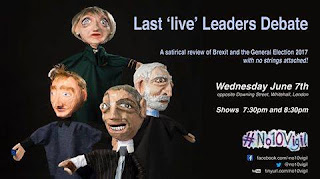Puppet Protest
May you be cursed to live in interesting times... so says the misquoted and mis-credited proverb.
Theatre has a responsibility to reflect the state of the nation, but one of the issues that theatre has is generally the long lead time to staging a piece. Several productions over the past year have looked at old events, such as Limehouse and This House, which depict political events from years ago and allow the audience to draw out the similarities, and therefore, maybe, give some idea of what might happen next in our current crisis.
It can be difficult to anticipate crises, which is why, I believe, we often read allegory into classic or already established work. Shakespeare is a case in point here: whenever a new staging takes place, we see parallels with our own time. I don't think that this is a bad thing, and I will discuss this further in a future blog.
However, in times of political crisis, guerrilla art comes in to its own. Reactionary and impromptu, theatrical performances can spring up as a result of an outpouring of passion: Aristotle believed that one of the functions of theatre was catharsis, the purging of high emotion, and at the moment there are few things that rouse a more emotional response than politics!
Something that caught my eye on social media was the Number 10 Vigil at Downing Street, using puppets to stage a 'final leaders debate.' This group use various styles of performance, including songs and spoken word, in a nightly demonstration, and they have incorporated Spitting Image style puppets into their protest.
Puppets have been used in performance and ceremony for hundreds of years: they have even been found in excavations of ancient Greek and Egyptian sites, believed to have been used in dramas depicting the stories of the gods.
Similarly to cartoons, puppets can 'say' and 'do' things that a human actor couldn't get away with, and the ridiculousness of the puppet form creates comedy in a situation that might otherwise be humourless. Humour humanises, and can create empathy and understanding through laughter by disarming an angry reaction - it's very difficult to get angry at a puppet!
I'm going to keep an eye on the No10Vigil and see what else they come up with: I feel that impromptu performance protest will expand over the next few years as people turn to the arts to express their hopes, fears and frustrations, which are sure to increase as political instability increases.
Theatre has a responsibility to reflect the state of the nation, but one of the issues that theatre has is generally the long lead time to staging a piece. Several productions over the past year have looked at old events, such as Limehouse and This House, which depict political events from years ago and allow the audience to draw out the similarities, and therefore, maybe, give some idea of what might happen next in our current crisis.
It can be difficult to anticipate crises, which is why, I believe, we often read allegory into classic or already established work. Shakespeare is a case in point here: whenever a new staging takes place, we see parallels with our own time. I don't think that this is a bad thing, and I will discuss this further in a future blog.
However, in times of political crisis, guerrilla art comes in to its own. Reactionary and impromptu, theatrical performances can spring up as a result of an outpouring of passion: Aristotle believed that one of the functions of theatre was catharsis, the purging of high emotion, and at the moment there are few things that rouse a more emotional response than politics!
Image Source: facebook.com/no10vigil/
Something that caught my eye on social media was the Number 10 Vigil at Downing Street, using puppets to stage a 'final leaders debate.' This group use various styles of performance, including songs and spoken word, in a nightly demonstration, and they have incorporated Spitting Image style puppets into their protest.
Puppets have been used in performance and ceremony for hundreds of years: they have even been found in excavations of ancient Greek and Egyptian sites, believed to have been used in dramas depicting the stories of the gods.
Similarly to cartoons, puppets can 'say' and 'do' things that a human actor couldn't get away with, and the ridiculousness of the puppet form creates comedy in a situation that might otherwise be humourless. Humour humanises, and can create empathy and understanding through laughter by disarming an angry reaction - it's very difficult to get angry at a puppet!
Image Source: pinterest.com
Ancient Greek marionette puppets
Ancient Greek marionette puppets
Because of the highly visual nature of puppetry it can communicate across language, learning, and cultural barriers, and the caricatures immediately convey the character, or what the creator would have the audience believe about the character!
I'm going to keep an eye on the No10Vigil and see what else they come up with: I feel that impromptu performance protest will expand over the next few years as people turn to the arts to express their hopes, fears and frustrations, which are sure to increase as political instability increases.





I never read,did Shakespeare at school, boring, but he did have his day.He expressed things going on in his time his way.This puppet business sounds interesting.Emotions can do a lot of things, show anger humour and if handled right can show solutions >Keep reporting.
ReplyDeletewww.naaztv.net
ReplyDeletePakistani Dramas
Hum Tv Aangan
Aangan Tv Episode
watch all episodes of angan drama
Watch Wrestling Online